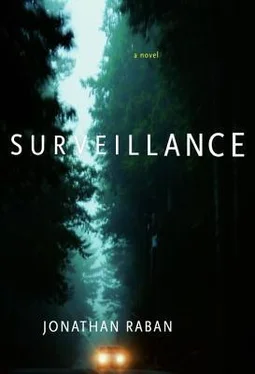Her worry was that even Miss Marple, so certain of her ground in St. Mary Mead, England, might be baffled by Seattle. Alida was happy drinking imaginary beer in the Blue Boar pub and doing imaginary shopping at Mr. Baker’s grocery. She’d pass the vicarage on the way to visit Colonel and Mrs. Bantry at Gossington Hall, and avoid the cows as she walked across Farmer Giles’s fields. There was a kind of logic in this English village that she feared was absent from the city she lived in. Miss Marple, at home in her ancient cottage, Danemead, inhabited a historical world where everything fit together satisfactorily. Like a jigsaw, it would seem an impossible jumble of pieces to begin with, but you knew that the picture was in there, hiding, waiting to be assembled. Seattle was different. America was different. What would Miss Marple make of her mom, or Tad, or Mr. Lee? Logic was logic: it ought to work everywhere, no matter when. But what if you lived in a world where the rules of logic had somehow ceased to apply? Did they work here and now ? Or only in old, logical places like St. Mary Mead?
It was like her granddad’s murder in Montana — a horrible accident, with no motive, no mystery, no clues, no logic at all. It just happened out of the blue, like cancer and hurricanes did. To Alida, her grandfather was more a face in framed photographs than a memory, but she was haunted by the flat fact of his murder — a word so scary that neither she nor her mom ever used it in conversation. “When Granddad died,” her mom would say. But he hadn’t died, he’d been shot to death like a character in an Agatha Christie book, except nothing else about it was Agatha Christie — like. There was no need for Miss Marple in Miles City, since everyone knew from the very beginning that Lewis Olson had done it. The only explanation Alida had ever been given was that he “hated the government,” which was a lousy motive since her granddad hadn’t been the government. Lewis Olson should have gone to jail for years and years, but they let him out early, and he was still writing letters from Montana that her mom scrunched up unread and threw into the trash. They were easy to spot because they always came in blue envelopes. Alida had fished out a couple and read them secretly — mostly crazy stuff about religion that didn’t even mention her granddad or why he’d shot him.
Brain spinning, Alida looked for security in the familiar shadows of her room — the pile of stuffed animals that she’d long outgrown on the chest of drawers, the Avril Lavigne poster that she’d never gotten around to taking down, the cluttered bookshelves where Dr. Seuss and Shel Silverstein and Winnie the Pooh kept Helen Keller and Anne Frank and Go Ask Alice company. She was reluctant to part with all the relics from when she was little, from dolls to old shoes, not so much out of babyish sentimental attachment but because they were essential data by which she could measure how far and fast she was now traveling. It was like keeping an eye on the speedometer in the Spider, watching her mom’s regular infractions of the posted limit. Alida liked going fast, but her mom drove way too fast — one time over seventy in a forty-five zone. Squinting at the dark shapes of flop-eared bunnies and teddy bears on the far side of the room, she wondered if a taste for speed was genetic or something.
On the floor, her soccer stuff was packed, ready for tomorrow, in her gym bag. Homework was safe in her backpack. For her alone, as it seemed to Alida, Billie Joe was singing,
Welcome to a new kind of tension…
Where everything isn’t meant to be okay…
She continued to listen for a few minutes more, then closed her book, switched off the iPod, and with the lullaby of “American Idiot” lingering in her ears, fell almost instantly asleep. Her halogen lamp stayed on. On the drapes, the lasers protecting the city flashed red-white, red-white, red-white, like waiting ambulances.

AT ONE A.M., Tad was deep in enemy territory, reading the Weekly Standard online. He resented subscriber-only sites because he felt they violated the easygoing democracy of the Internet, but had recently forked out $32 for William Kristol’s magazine because it was a source of such rich and alarming intelligence about the thought processes of the administration. Everything Tad hated and feared most — invasions, torture, wiretapping, detention without charge, secret courts — could be counted on to find its champion in the Weekly Standard. The president’s closest advisers were said to read it, so Tad thought it his duty as a citizen to read it, too.
Tonight he was trying to follow the arguments of a law professor at some university he’d never heard of — an “originalist” interpretation of the Fourth Amendment, based on what he called “a first-clause-dominant” reading of it. Apparently, what the Founders really meant when they wrote of the “right of the people to be secure in their persons, houses, papers, and effects, against unreasonable searches and seizures” was that the federal government could lawfully search and seize, bug and imprison, so long as it deemed such actions “reasonable.” The liberal Supreme Court under Earl Warren — always a black name in the Weekly Standard —had gotten the whole amendment ass-backwards. The true purpose of the Fourth was to free government from the tiresome, time-consuming business of going to the courts and getting warrants.
Once, Tad would have been incredulous. Now he took stuff like this as just part of the normal weather of the times. In the name of fidelity to the original intentions of the Constitution and the Bill of Rights, the hard-right revisionists were systematically rewriting both documents to bring them into line with administration thinking, brazenly recasting Madison and Jefferson in their own ugly image, turning sentences inside out to reverse their meanings.
There was melancholy satisfaction in the professor’s article, so amply did it confirm Tad’s sense that a legion of industrious rats was gnawing away at his country’s very foundations. Just as he was phrasing this thought to himself, he felt a rippling shudder pass through the seat of his chair, as if a convoy of big trucks were passing by, and the wooden desktop seemed to momentarily squirm under the heel of his palm. He instinctively looked to the doorframe for shelter, but the temblor was already over — a little one, maybe a two-point-something, so slight and brief that at this hour it would be a secret between a few insomniacs and the shivering needles of the seismographs in the geophysics lab at the University of Washington.
The needles were rarely still. Every day brought half a dozen significant tremors to the state, and Seattle, sitting astride its own fault line, with the Juan de Fuca fault close at hand, was built on jittery, uncertain ground. Tad had lost count of the times he’d heard the sound of rock grinding on rock deep below the earth, though to his chagrin he’d been out of town, in a forgettable production of The Iceman Cometh in Minneapolis, for the Ash Wednesday quake of 2001, which, had it lasted fifteen seconds longer, would have brought down the Alaskan Way viaduct and wrecked half the older buildings in the city.
Growing up across the Columbia River from the palpitating snowy bulk of Mount St. Helens, Tad learned to relish warning tremors like the one just past. He imagined the great tectonic plates ceaselessly slipping, shifting, rubbing, as if the planet were trying to shrug off the unnatural weight of tar and concrete, brick and steel, that humans had carelessly piled on to it. Anative West Coaster, Tad knew the instability of the ground beneath his feet, and when he worked with easterners he was aware of how this knowledge separated them. On the whole, he thought, earthquakes were good for you, and every city ought to be rattled to its foundations every once in a while, to alert its people to their precarious footing in the world.
Читать дальше













